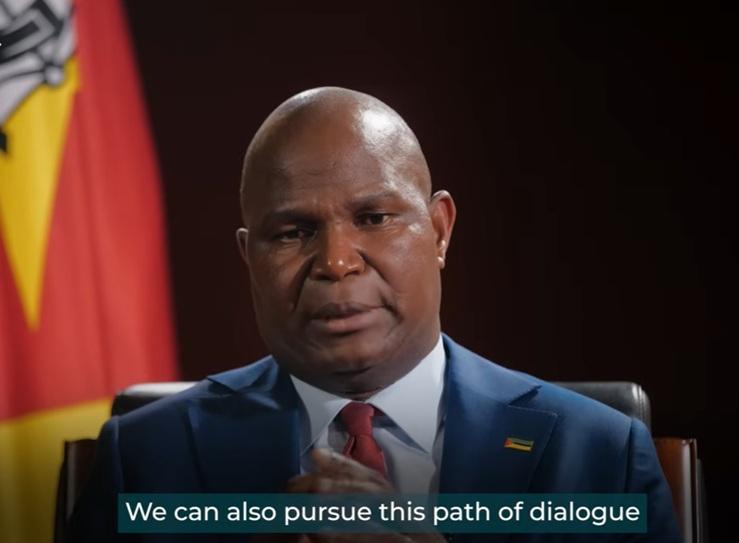Africa-Press – Mozambique. President Daniel Chapo has once again admitted the possibility of dialogue with the leaders of the terrorist group, aiming to end the insurgency that has brought terror, mourning, and suffering to Cabo Delgado province for the past eight years. The Head of State reaffirmed this position in a recent interview with Al Jazeera, Qatar’s state television.
According to Daniel Chapo, the government is currently working on two approaches to combat the insurgency: one military and the other diplomatic.
“One [solution] is to continue fighting terrorism on the ground, with the support of the region [SADC countries] and other partners of Mozambique, such as Tanzania and Rwanda. Therefore, we will not stop fighting on the ground, in defence of the homeland, independence, sovereignty, and our people.”
“We can also pursue this path of dialogue and find a solution that could lead to the end of the insurgency. Dialogue is the basis for resolving any conflict, and this is one of them. Experience shows, worldwide, that any conflict always ends at the table of dialogue,” argued the Mozambican Head of State.
“We fought for ten years, but to end it, we had to sit down with colonialism. There was a 16-year war, but to end it, we had to sit down and reach the General Peace Agreement. So, we will continue working (fighting on the ground), while we also try to identify the leaders and their motivations, to see if, through this path, we can also continue working,” Chapo added.
For the Head of State, the most important thing is to achieve peace and security for the province of Cabo Delgado and for the Republic of Mozambique, in order to develop both the province and the country.
“The insurgency isn’t present throughout Cabo Delgado province. It’s mainly in some districts in the northern part of Cabo Delgado province, where these resources, especially natural gas, are found,” he emphasised.
It should be noted that this isn’t the first time the Head of State has publicly acknowledged the possibility of dialogue with the “correct leaderships” of terrorist groups, citing the same examples—namely, the armed struggle for national liberation and the civil war with Renamo.
“We must continue to fight on the ground [against the insurgents in Cabo Delgado], but at the same time, find lines of dialogue. With Renamo, we started by calling them armed bandits who dispersed to rob the population, but then we realised there’s an organised structure. And when there’s a structure, there are motivations,” said Chapo during a press conference with Mozambican journalists in Maputo on the eve of national independence celebrations.
At the time, he argued that the security situation in Cabo Delgado was under control by the Defence and Security Forces (FDS) and the Rwandan military, and that it was necessary to identify the “correct leaderships” of the insurgents.
“We have to understand that there is motivation, that there is leadership, and there are logistics. We have to follow both paths: one, fighting on the ground, and the other, understanding this structure—as we did with Renamo, when we understood who the true leaders were (…). Wars always end with dialogue; we believe that dialogue is essential.”
However, three months after admitting this possibility, the President of the Republic has yet to provide any information on progress in this endeavour—whether or not any contacts have already been initiated with the terrorist group’s leaders.
For More News And Analysis About Mozambique Follow Africa-Press






